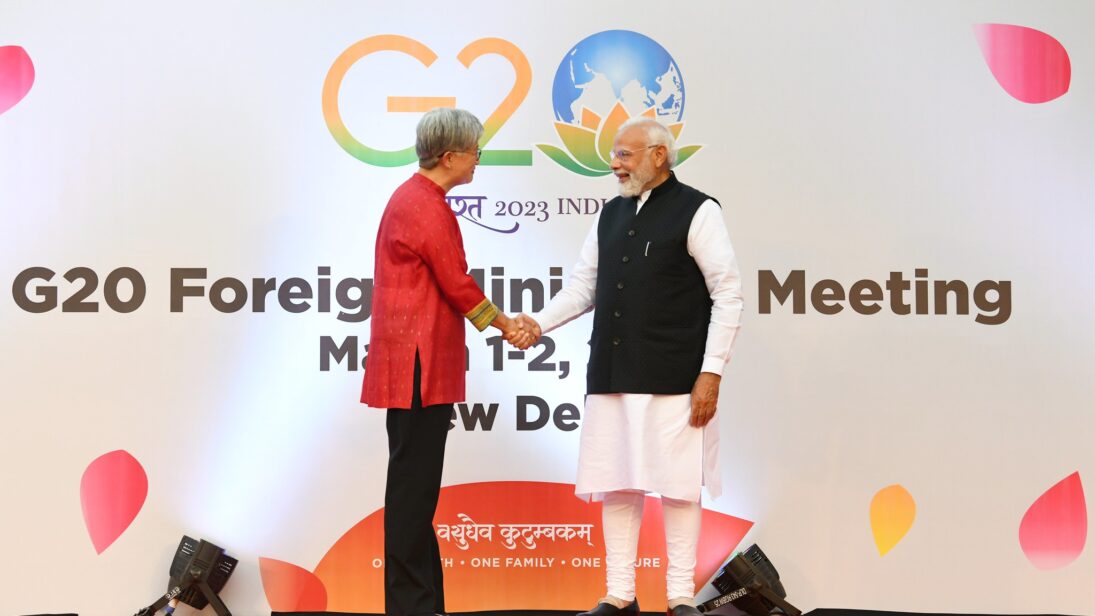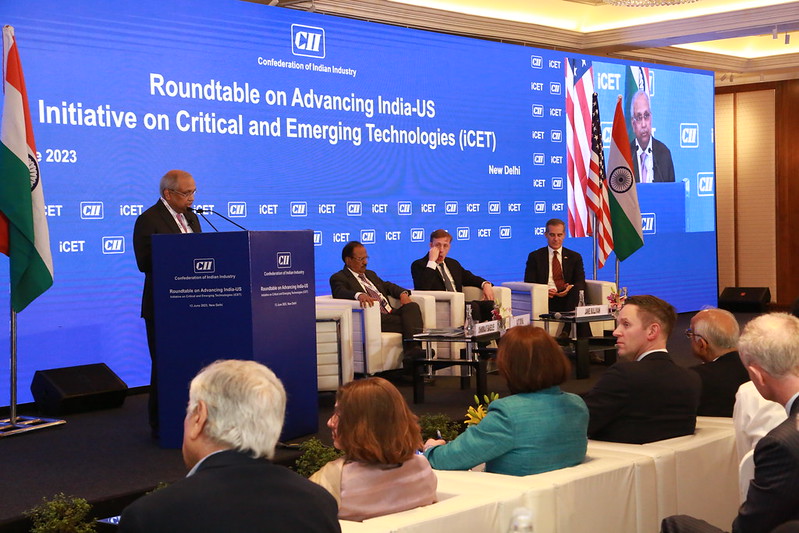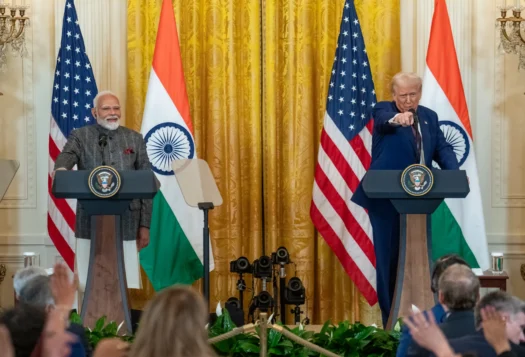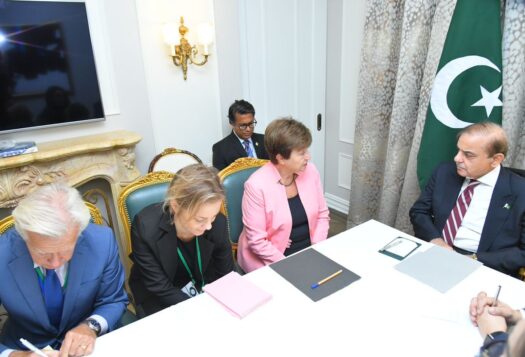
At present, international relations are at a point of transition as technology and foreign policy increasingly intersect. Pervasive technological forces have brought radical social change, forced governments to innovate, and prompted new approaches for how governments and citizens interact. Catchphrases are emerging each day to describe this trend, like- ‘tech diplomacy or techplomacy’, ‘cyber diplomacy’, and ‘digital diplomacy’. Over the years, India has embraced technology as a core tenet of its diplomatic outreach and rise as a great power. With a robust digital public infrastructure and penetration of wide-ranging digital services across the country, it is setting a global benchmark. While India offers myriad benefits through tech cooperation, domestic political factors may limit the extent to which tech can propel India’s rise.
India’s Tech Diplomacy
The Indian government is painstakingly integrating technology into various diplomatic agreements, specifically with established technological powers. For instance, on the sidelines of the Quad meeting in Tokyo in May 2022, U.S. President Joe Biden and Indian Prime Minister Narendra Modi together announced the U.S.-India initiative on Critical and Emerging Technology (iCET). The key takeaways of the iCET center on collaboration in areas like AI, supporting the enhancement of a semiconductor ecosystem, advancing cooperation on development in 5G and 6G, and incorporating Open RAN (Open Radio Access Network) technology in India.
During his state visit to the United States in June 2023, Prime Minister Modi declared that “…Our goal is to make this decade a techade – tech decade.” Notably, ahead of the Prime Minister’s visit, India’s Ambassador to the United States Taranjit Singh Sandhu, while addressing the annual India Ideas Summit in Washington explicitly stated,
“…What is that one force-multiplier for this relationship, and for global well-being indeed, it is tech. It is that master key to unlock the real potential in the relationship…Tech, to me, is powered by trust. It is as much strategic as (it is) commercial.”
Additionally, during the recently organized G20 Digital Economic Ministerial Meeting at the helm of the Indian Presidency in Bengaluru, a trailblazing consensus was reached on devising competent mechanisms to shape digital public infrastructure (DPI) as an accelerator of the Sustainable Development Goals. For the first time during the meeting, an unambiguous delineation of DPI was collectively acknowledged by the countries. Alongside this breakthrough, the Indian Presidency’s proposal (backed by the UNDP and its knowledge partners) to set up ‘One Future Alliance’ (OFA) was positively welcomed by the G20 Digital Ministers. The proposed alliance seeks to bring together all relevant stakeholders – ranging from government to the private sector, academia, research institutions, donor agencies and civil society organizations, to harmonize global efforts in boosting the DPI ecosystem.
The formation of the EU-India Trade and Technology Council (TTC) is also noteworthy from the standpoint of India’s leveraging tech diplomacy. In April 2022, the President of the European Commission and the Indian Prime Minister jointly agreed to launch the TTC at their meeting in New Delhi. They eventually elucidated that the council would substantially function as a “strategic coordination mechanism”, wherein both the partners would amicably tackle trade, technology, trust, and security-related challenges. Interestingly, it was the first time that India made headway to set up a council of this kind with any of its external partners. Since forming the Council, the EU and India had their first TTC ministerial meeting in Brussels in May 2023. The key outcomes of this maiden meeting were that both the partners agreed to seek cooperation on “quantum and High-Performance Computing research and development projects,” “trustworthy artificial intelligence,” and would coordinate their policies around strategic semiconductors.
In the light of these crucial developments, it is evident that tech diplomacy has become a driving force for India through which it strives to capture the potential of the nexus between technological innovation and geo-economic development. With the remarkable presence of global technology businesses within the country and the massive inflow of foreign direct investments to the information technology sector, India is highly focused on strengthening global economic cooperation in the realm of technology. It is also incredibly inclined toward spilling over the benefits of advanced technologies to the unconnected regions of the Global South and Small Island Developing States (SIDS).
Moreover, to shape its techno-strategic policy directives, India’s Ministry of External Affairs in 2020 created some technically specialized divisions within the ministry, such as the Cyber Diplomacy Division, E-Governance and Information Technology Division, and the New Emerging and Strategic Technologies Division (NEST Division). Most importantly, the NEST division, which deals with technology governance rules, standards and architecture, has played a major role in pushing India to join as a founding member of the Global Partnership on Artificial Intelligence (GPAI) and the International Research Center on Artificial Intelligence (IRCAI).

New digital legislations and impending concerns
While India is certainly seizing the tech moment, it is nevertheless conscious that connectivity must be in coordination with peoples’ confidence and trust in technology, which may often become unsettling and perilous due to unconventional design, expeditious flow, and fingertip access. In this regard, the focus is primarily geared toward enhancing adequate safeguards and incorporating regulatory mechanisms.
Most recently, India has come up with the Digital Personal Data Protection Act (DPDP Act), which intends to legitimately protect the personal data of individuals and if required, process such personal data for lawful purposes based on the consent of Data Principal (individual to whom the personal data relates). However, the act has received strong resistance on the grounds of making personal information more transparent for the sake of governmental and private interests. It was also criticized for ambiguously amending significant provisions of the Information Technology Act and the Right to Information Act and creating an opaque Data Protection Board under the jackboot of the executive.
Concurrently, the Union Cabinet gave the green light to the New Telecom Bill 2023, which seeks to “restructure the legal and regulatory framework” of the telecommunications sector in the wake of emerging challenges and opportunities, and to expand the scope of telecommunication services to include “OTT, broadband, internet-based, and satellite-based communication services.” Yet again, concerns have been raised over the lack of an effective oversight mechanism, robust definition of OTT communication services, and clarity in the scope and procedure of licensing. Hence, it is imperative for the government to address these inhibitions by seriously taking heed of the tangible public arguments and concerns. In an information society where the spread of misinformation and deepfakes are becoming common practices, maintaining the sanctity and morality of the underlying legislations is paramount.
Ways Ahead
Although India is gaining ground with its ‘techplomacy’ strategies, it needs to devise a comprehensive action-oriented framework to yield sustainable benefits. At the domestic level, a systematic evaluation regarding the application of critical and emerging technologies is required before their large-scale deployment. As an example, India needs to have more informed discussions and debates on the responsible and just use of the artificial intelligence system in society.
Although India is gaining ground with its ‘techplomacy’ strategies, it needs to devise a comprehensive action-oriented framework to yield sustainable benefits.
On the global front, India is undeniably playing a prominent role in spearheading the idea of equitable, inclusive, resilient, safe, and sustainable technology-led development. However, in the wake of the shifting landscape of digital geopolitics, several countries like Australia, Denmark, France, and Switzerland have embraced a “comprehensive digital foreign policy strategy.” Denmark made history when it appointed a long-serving diplomat- Casper Klynge, as the world’s first tech ambassador in 2017. In June 2022, the U.S. Department of Defense established the Chief Digital and Artificial Intelligence Office (CDAO). In May 2022, Ireland appointed Dr. Patricia Scanlon as its first AI Ambassador to strengthen the government’s national AI strategy. India should follow suite and contemplate catapulting technology as its diplomatic hallmark. At a time when tech-offensives are proliferating and the neighboring China is enhancing a new digital economy by making the Digital Silk Road initiative a grand foreign policy priority, India needs to be more cautious yet dynamic in its approach.
Also Read: India in America’s Vision
***
Click here to read this article in Urdu.
Image 1: PM Modi at G20 summit 2023 via Flickr
Image 2: India-US Roundtable on iCET via Flickr


